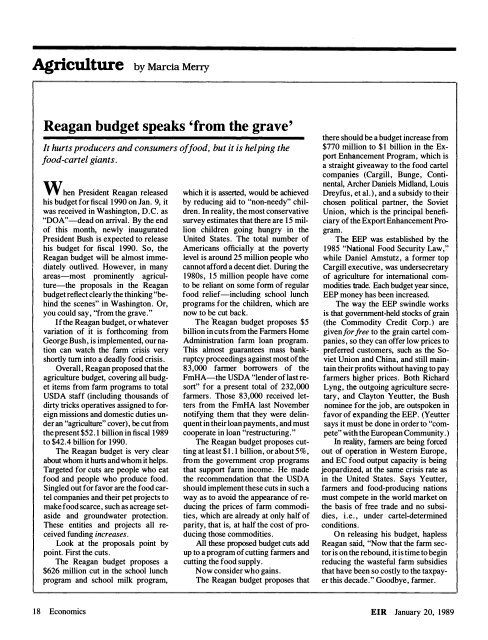View Full Issue - Executive Intelligence Review
View Full Issue - Executive Intelligence Review
View Full Issue - Executive Intelligence Review
You also want an ePaper? Increase the reach of your titles
YUMPU automatically turns print PDFs into web optimized ePapers that Google loves.
Agriculture by Marcia Meny<br />
Reagan budget speaks 'from the grave'<br />
It hurts producers and consumers offood, but it is helping the<br />
food-cartel giants .<br />
W hen President Reagan released<br />
his budget for fiscal 1990 on Jan. 9, it<br />
was received in Washington, D.C. as<br />
"DOA"-dead on arrival. By the end<br />
of this month, newly inaugurated<br />
President Bush is expected to release<br />
his budget for fiscal 1990. So, the<br />
Reagan budget will be almost immediately<br />
outlived. However, in many<br />
areas-most prominently agriculture-the<br />
proposals in the Reagan<br />
budget reflect clearly the thinking "behind<br />
the scenes" in Washington. Or,<br />
you could say, "from the grave."<br />
If the Reagan budget, or whatever<br />
variation of it is forthcoming from<br />
George Bush, is implemented, our nation<br />
can watch the farm crisis very<br />
shortly turn into a deadly food crisis.<br />
Overall, Reagan proposed that the<br />
agriculture budget, covering all budget<br />
items from farm programs to total<br />
USDA staff (including thousands of<br />
dirty tricks operatives assigned to foreign<br />
missions and domestic duties under<br />
an "agriculture" cover), be cut from<br />
the present $52.1 billion in fiscal 1989<br />
to $42.4 billion for 1990.<br />
The Reagan budget is very clear<br />
about whom it hurts and whom it helps.<br />
Targeted for cuts are people who eat<br />
food and people who produce food.<br />
Singled out for favor are the food cartel<br />
companies and their pet projects to<br />
make food scarce, such as acreage setaside<br />
and groundwater protection.<br />
These entities and projects all received<br />
funding increases.<br />
Look at the proposals point by<br />
point. First the cuts.<br />
The Reagan budget proposes a<br />
$626 million cut in the school lunch<br />
program and school milk program,<br />
18 Economics<br />
which it is asserted, would be achieved<br />
by reducing aid to "non-needy" children.<br />
In reality, the most conservative<br />
survey estimates that there are 15 million<br />
children going hungry in the<br />
United States. The total number of<br />
Americans officially at the poverty<br />
level is around 25 million people who<br />
cannot afford a decent diet. During the<br />
1980s, 15 million people have come<br />
to be reliant on some form of regular<br />
food relief-including school lunch<br />
programs for the children, which are<br />
now to be cut back.<br />
The " Reagan budget proposes $5<br />
billion in cuts from the Farmers Home<br />
Administration farm loan program.<br />
This almost guarantees mass bankruptcy<br />
proceedings against most of the<br />
83,000 farmer borrowers of the<br />
FmHA-the USDA "lender oflast resort"<br />
for a. present total of 232,000<br />
farmers. Those 83,000 received letters<br />
from the FmHA last November<br />
notifying them that they were delinquent<br />
in their loan payments, and must<br />
cooperate in loan "restructuring."<br />
The Reagan budget proposes cutting<br />
at least $1.1 billion, or about 5%,<br />
from the government crop programs<br />
that support farm income. He made<br />
the recommendation that the USDA<br />
should implement these cuts in such a<br />
way as to avoid the appearance of reducing<br />
the prices of farm commodities,<br />
which are already at only half of<br />
parity, that is, at half the cost of producing<br />
those commodities.<br />
All these proposed budget cuts add<br />
up to a program of cutting farmers and<br />
cutting the food supply.<br />
Now consider who gains.<br />
The Reagan budget proposes that<br />
there should be a budget increase from<br />
$770 million to $1 billion in the Export<br />
Enhancement Program, which is<br />
a straight giveaway to the food cartel<br />
companies (Cargill, Bunge, Continental,<br />
Archer Daniels Midland, Louis<br />
Dreyfus, et al.), and a subsidy to their<br />
chosen political partner, the Soviet<br />
Union, which is the principal beneficiary<br />
of the Export Enhancement Program.<br />
The EEP was established by the<br />
1985 "National Food Security Law,"<br />
while Daniel Amstutz, a former top<br />
Cargill executive, was undersecretary<br />
of agriculture for international commodities<br />
trade. Each budget year since,<br />
EEP money has been increased.<br />
The way the EEP swindle works<br />
is that govemment-held stocks of grain<br />
(the Commodity Credit Corp.) are<br />
given/or free to the grain cartel companies,<br />
so they can offer low prices to<br />
preferred customers, such as the Soviet<br />
Union and China, and still maintain<br />
their profits without having to pay<br />
farmers higher prices. Both Richard<br />
Lyng, the outgoing agriculture secretary<br />
, and Clayton Yeutter, the Bush<br />
nominee for the job, are outspoken in<br />
favor of expanding the EEP. (Yeutter<br />
says it must be done in order to "compete"<br />
with the European Community.)<br />
In reality, farmers are being forced<br />
out of operation in Western Europe,<br />
and EC food output capacity is being<br />
jeopardized, at the same crisis rate as<br />
in the United States. Says Yeutter,<br />
farmers and food-producing nations<br />
must compete in the world market on<br />
the basis of free trade and no subsidies,<br />
i.e., under cartel-determined<br />
conditions.<br />
On releasing his budget, hapless<br />
Reagan said, "Now that the farm sector<br />
is on the rebound, it is time to begin<br />
reducing the wasteful farm subsidies<br />
that have been so costly to the taxpayer<br />
this decade." Goodbye, farmer.<br />
EIR January 20, 1989

















